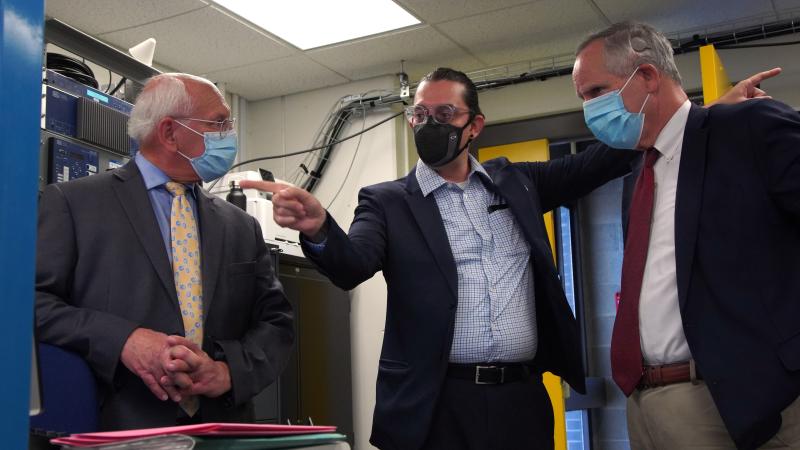Congressmen Paul Tonko (D-NY) and David McKinley (R-WV) engage with expert researchers
September 8, 2021

Faculty from Rensselaer Polytechnic Institute served as experts in an exchange of information about developments in the field of sustainable energy, large-scale environmental change, and innovative and interdisciplinary research into energy storage and smart systems in the built environment on a recent visit by two members of the U.S. Congress.
Congressman Paul Tonko (D-NY) and Congressman David B. McKinley (R-WV) toured the Rensselaer campus to highlight the scientific advances being made that will drive the green economy and renewable energy for the region, the nation, and the world.
Both Representatives are members of the House Energy and Commerce Committee. Rep. Tonko is the chair of the Subcommittee on Environment and Climate Change; Rep. McKinley is the ranking member on that same subcommittee.
During their visit, the Congressmen heard from Rensselaer faculty members representing crucial areas of multidisciplinary research that are of fundamental significance to energy efficiency, renewable technologies, and the understanding of global environmental change to preserve the biodiversity of the planet:
- Luigi Vanfretti, associate professor in the Department of Electrical, Computer, and Systems Engineering, demonstrated a cyber-physical power grid simulation in the Rensselaer ALSETLab to show the importance of modeling to improve and protect utility networks.
- Emily Liu, professor in the Department of Mechanical, Aerospace, and Nuclear Engineering, talked about fundamental and applied research into solar concentrators for energy generation and storage that provides critical understanding on corrosion mechanisms caused by molten salt fluid, a key obstacle in realizing next generation power technology.
- Kevin Rose, professor in the Department of Biological Sciences, offered insight on his work to understand the scope of the global challenge of large-scale environmental change, specifically his recent findings that the world’s lakes are losing oxygen as the planet warms, which threatens freshwater biodiversity and the quality of drinking water.
- Alexandros Tsamis, associate director of the Center for Architecture Science and Ecology (CASE), briefed the Congressmen on several ways to reduce the carbon footprint of the built environment including the use of hemp composites as universal materials for construction and developing climate-adaptive energy systems that will heat and cool buildings using both renewable and traditional energy sources.
- Robert Karlicek, director of the Center for Lighting Enabled Systems and Applications (LESA) and co-director of the Institute for the Environment, Built Environment, and Smart Systems (EBESS), gave a broad overview into the research efforts of these two centers to save energy through concepts such as advanced sensing systems that use light to determine when people are present to efficiently adjust HVAC settings and intelligent traffic management systems developed by José Holguin-Veras, professor in the Department of Civil and Environmental Engineering, that schedule deliveries during off-hours.
Dr. Shirley Ann Jackson, the President of Rensselaer, announced the launch of EBESS at President Joe Biden’s Leader’s Summit on Climate in April.
“Our Capital Region scientists and researchers are among America’s most talented pioneers in scientific discovery,” Tonko said. “As leading experts and innovators, they play a key role in developing the technologies to guide our nation toward a clean energy future. I am eager to take the powerful insights and expertise of our researchers at Rensselaer back to Washington to develop legislation that will build a stronger, more competitive America.”
“Seeing the research here at Rensselaer gives us the opportunity to learn together and talk to each other in order to achieve what’s best for the American people,” McKinley said.
“Research at Rensselaer addresses the most pressing challenges of our time,” said Robert Hull, acting vice president of research. “Informing legislators, policy makers, and other stakeholders is one of the cornerstones of our multidisciplinary approach to changing the world.”
The lawmakers came to Rensselaer as part of the American Congressional Exchange project organized by the Bipartisan Policy Center (BPC).
The Bipartisan Policy Center is a Washington, D.C.-based think tank that offers policy solutions created through informed deliberations by officials, academics, advocates, and business leaders and uses bipartisanship to explore perspectives from both political parties to promote health, security, and opportunity for Americans.
“The Rensselaer visit truly highlights the core of the American Congressional Exchange program,” said John Richter, director of BPC’s Congress Project. “It’s imperative we continue making these connections and bring together both sides of the aisle to understand the challenges our communities face and work in conjunction to craft sound public policy to tackle these hurdles.”